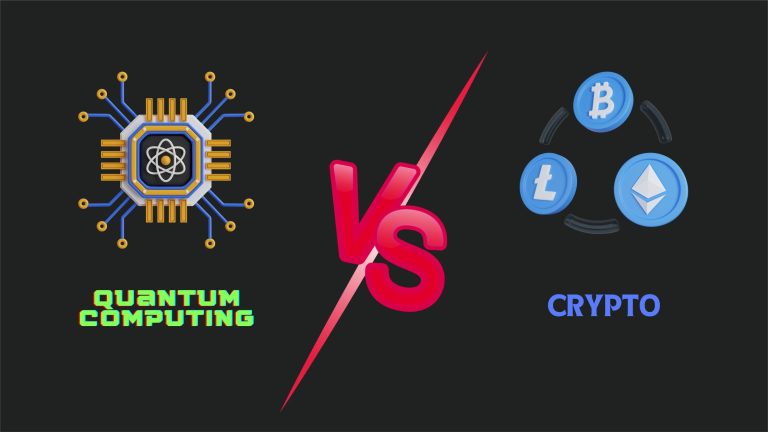Crypto and blockchain technology have revolutionized the way we think about financial transactions, providing a decentralized, secure, and transparent way to transfer value. However, a new technological frontier is emerging: quantum computing. As quantum computers are so powerful, what happens when quantum computing meets crypto?
In this article, we’ll explore the intersection of quantum computing meets blockchain technology, assessing whether quantum computers truly threaten the security of crypto and what steps the industry can take to prepare for this potential future.
What Is Quantum Computing?
Quantum computing is a major leap in the power of computation. Unlike traditional computers, which process information in binary (as 0s and 1s), quantum computers use quantum bits, or qubits, which can represent both 0 and 1 simultaneously due to a phenomenon known as superposition. Quantum computers perform calculations faster than classic computers.
While quantum computing is still in its early stages, its potential to solve complex problems—such as factoring large numbers or simulating molecular structures—has significant implications for fields ranging from medicine to cybersecurity.
How Does Quantum Computing Affect Crypto?
At the heart of cryptocurrency security lies cryptography. Crypto relies on cryptographic algorithms to ensure the security of transactions and the integrity of the blockchain. Two key cryptographic techniques used in blockchain are:
- Public-Key Cryptography: This is used to secure the private keys of crypto users. Public-key cryptography involves a pair of keys—one public and one private—that allow users to sign transactions securely.
- Hashing Algorithms: Hashing is used to secure the blockchain itself, ensuring that previous transactions cannot be altered and that the network remains tamper-proof.
Quantum computing has the potential to disrupt both of these cryptographic techniques. In particular, a sufficiently powerful quantum computer could break the encryption methods that protect private keys, as well as undermine the hashing algorithms that secure the blockchain.
The Quantum Threat: Is It Real?
The concern that quantum computing could break cryptocurrency security is not just theoretical. For example, Shor’s algorithm, a quantum algorithm designed to factor large numbers, could be used to break the RSA and Elliptic Curve Digital Signature Algorithm (ECDSA) encryption methods. ECDSA is widely used in crypto to protect private keys.
However, it’s important to understand that quantum computers capable of breaking these cryptographic protocols do not exist yet. While progress is being made in quantum computing, we are still years—if not decades—away from having machines powerful enough to pose a real threat to blockchain security. Current quantum computers are still too small and error-prone to perform the complex calculations required to break modern cryptographic systems.
Preparing for the Quantum Era
Despite the quantum threat being far from immediate, the crypto community is not idle. Researchers and blockchain developers are actively working on “quantum-resistant” cryptographic techniques that could safeguard crypto from future quantum attacks. These solutions include:
Quantum-Resistant Algorithms
Cryptographers are developing new types of encryption methods, such as lattice-based cryptography, which are believed to be resistant to quantum computing attacks. These algorithms could replace existing public-key cryptography systems in crypto.
Post-Quantum Cryptography
A subset of cryptography that focuses on creating systems secure against quantum computers. Many blockchain projects are already exploring ways to integrate post-quantum cryptographic techniques into their networks.
Blockchain Upgrades
Some blockchain networks are built with the flexibility to upgrade their security protocols in the future. This means that if quantum computing ever becomes a genuine threat, the blockchain’s cryptographic algorithms could be swapped out for quantum-resistant alternatives through network-wide upgrades or hard forks.
How Close Are We to a Quantum Threat?
While the idea of quantum computing breaking crypto security makes attention-grabbing headlines, the reality is more measured. Estimates suggest that it could take several more decades before we have quantum computers powerful enough to crack the cryptographic systems currently used in crypto. In the meantime, cryptographers and developers will have ample opportunity to design and implement defenses.
In addition, quantum computers would need to be large enough and widely available for malicious actors to pose a serious threat to global blockchain networks. Given the current trajectory of quantum computing development, it is far more likely that we will see practical solutions to the quantum problem long before it becomes a critical issue.
Conclusion
Quantum computing and blockchain represent two of the most transformative technologies of the 21st century. While quantum computing has the potential to challenge the cryptographic foundations of crypto, this threat remains speculative and distant for now. The crypto community is already aware of the risks and is actively working on developing quantum-resistant solutions.
As quantum technology progresses, blockchain developers need to continue innovating to stay ahead of potential threats. In the end, the crypto ecosystem has a track record of adaptability, and it’s likely that as quantum computing advances, so too will the security measures that protect crypto.
Follow Our Official Social Channels:
